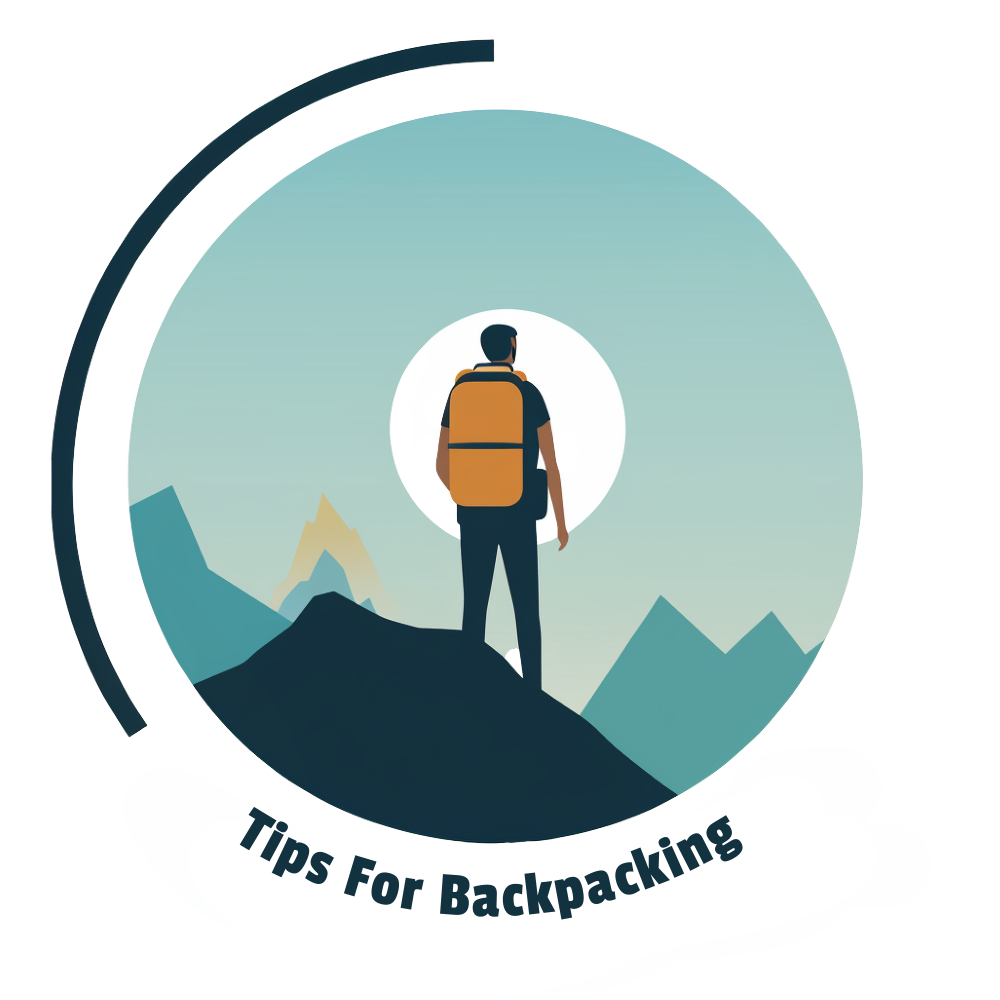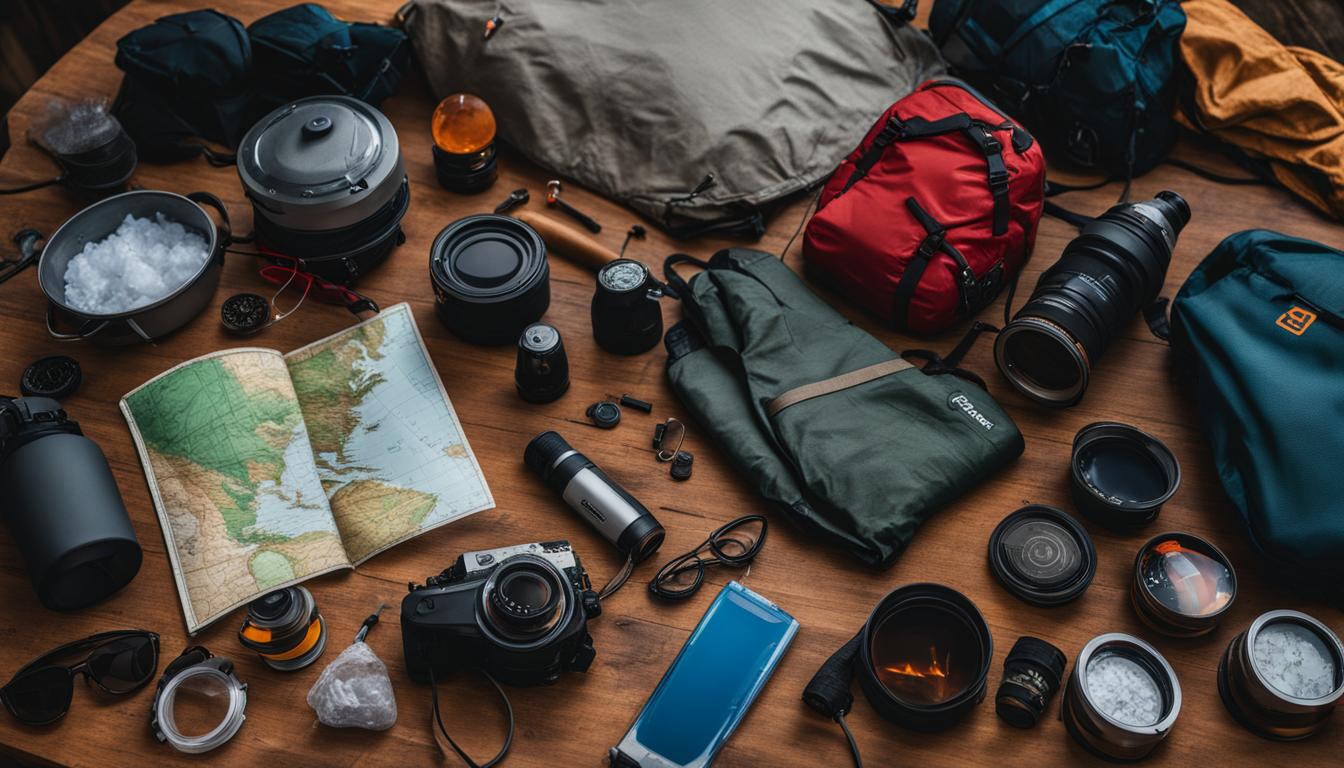Backpacking is an exciting outdoor adventure that involves carrying only the essentials on your back. Before embarking on a backpacking trip, I consider factors such as the distance, remoteness, and weather conditions. The longer and more remote the hike, and the more inclement the weather, the more gear, clothing, food, and water I will need. Here is a comprehensive checklist of essential items that should be part of your backpacking preparation:
Key Takeaways:
- Planning and preparing for a backpacking trip is essential for a safe and enjoyable experience.
- Consider the distance, remoteness, and weather conditions when packing your gear.
- Choose the right gear, including a backpack, tent, sleeping bag, and cooking equipment.
- Don’t forget to pack essential clothing, food, water, and first aid supplies.
- Tailor the checklist to your specific trip requirements and personal preferences.
Choosing the right gear for your backpacking trip
When it comes to backpacking, having the right gear can make all the difference in ensuring a successful and enjoyable trip. Here are some essential items that should be part of your backpacking gear checklist:
Tents and Sleeping Bags
A reliable tent and a comfortable sleeping bag are essential for a good night’s rest in the great outdoors. Look for a lightweight and durable tent that can withstand various weather conditions. Choose a sleeping bag that is suitable for the climate you will be camping in, whether it’s a warm summer night or a chilly winter evening.
Clothing and Footwear
Proper clothing and footwear are crucial for staying comfortable and protected during your backpacking adventure. Opt for moisture-wicking and quick-drying materials, as well as layering options to adapt to changing weather conditions. Don’t forget to pack a sturdy pair of hiking boots or shoes that provide excellent traction and support for long walks on uneven terrain.
Cooking and Food Supplies
When it comes to food, lightweight and compact cooking supplies are ideal for backpacking trips. Consider investing in a lightweight stove, cooking utensils, and cookware specifically designed for outdoor use. Pack nutritious and lightweight food options that are easy to prepare and won’t weigh you down on the trail.
Remember, the key to choosing the right gear for your backpacking trip is to strike a balance between functionality, durability, and weight. Prioritize items that will enhance your comfort, safety, and overall experience in the wilderness.
Additional considerations for planning a backpacking trip
Planning a backpacking trip involves more than just packing the right gear. Here are some additional factors to consider:
Research your destination
Before embarking on your backpacking adventure, it’s important to research your destination thoroughly. Familiarize yourself with the local regulations, camping restrictions, and any permits required. Pay attention to the weather patterns, terrain, and potential hazards such as wildlife or difficult terrain. By having a good understanding of your destination, you can better prepare for the challenges you may encounter along the way.
Create an itinerary
Having a well-planned itinerary is crucial for a smooth backpacking trip. Take the time to map out your route, considering the distance covered, the elevation gain, and the estimated time for each leg of the journey. This will help you stay on track and ensure that you have enough time to reach your planned campsites or landmarks. Be sure to factor in rest days and contingency plans in case of unexpected delays or emergencies.
Check equipment for functionality
Prior to embarking on your backpacking trip, thoroughly inspect all your equipment to ensure it is in good working condition. Check your tent for any tears or damage, test your stove and fuel canisters, and make sure your backpack is comfortable and properly fitted. Don’t forget to check the condition of your sleeping bag, sleeping pad, and other essential gear. It’s better to discover any issues before your trip rather than dealing with them in the wilderness.
By taking these additional considerations into account, you can better plan and prepare for your backpacking trip. Remember to always prioritize safety, leave no trace, and follow any guidelines set by park authorities. With proper planning, you can embark on a memorable and enjoyable adventure in the great outdoors.
In conclusion
So there you have it, the ultimate backpacking trip checklist to ensure you’re fully prepared for your next adventure. By following this comprehensive list of essentials, you can rest assured that you have everything you need for a safe and enjoyable experience.
Remember, packing the right gear is crucial. From a sturdy backpack and a reliable tent to a quality sleeping bag and comfortable hiking boots, each item plays a significant role in ensuring your comfort and safety on the trail.
But it’s not just about the gear. Planning is key. Take into consideration factors such as the distance, remoteness, and weather conditions of your trip. Tailor the checklist to suit your specific needs and preferences, and don’t forget to check off each item as you pack.
So, whether you’re embarking on a short weekend hike or a multi-day expedition, make sure you have your backpacking trip essentials in order. Happy backpacking!
What should be included in the ultimate preparation checklist for backpacking trips?
When preparing for backpacking trips, it’s crucial to follow some essential pretrip planning steps. Your ultimate preparation checklist should include researching the trail conditions, packing necessary gear, obtaining required permits, planning meals and snacks, organizing transportation, and informing someone of your itinerary for safety reasons.
FAQ
What should be included in a backpacking preparation checklist?
Your backpacking preparation checklist should include essential items such as gear, clothing, food, and water. It is important to consider factors such as distance, remoteness, and weather conditions when selecting these items.
What gear should I consider for my backpacking trip?
Key gear items to consider for your backpacking trip include a backpack, tent, sleeping bag, camp stove, water filter, and map and compass. These items will help ensure your safety and comfort during the hike.
What additional factors should I consider when planning a backpacking trip?
When planning a backpacking trip, you should also consider factors such as permits and regulations, trail conditions, navigation skills, emergency preparedness, and Leave No Trace principles. These factors will help you have a successful and responsible adventure.
How can I ensure a safe and enjoyable backpacking experience?
Planning and preparing for your backpacking trip is essential. By following the ultimate preparation checklist provided, you can feel confident that you have packed all the necessary gear, clothing, and supplies. Remember to tailor the checklist to your specific trip requirements and personal preferences.

